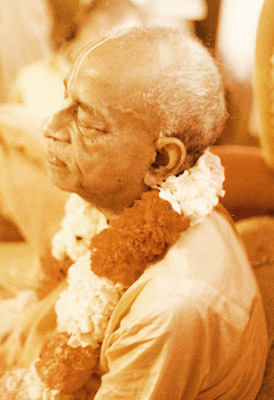Special On-line Edition for the Disappearance Day of
Śrī Śrīmad Bhaktivedānta Svāmī Mahārāja
śrī śrī guru gaurāṅga jayataḥ!

Year-2, Special On-line Edition
Posted: 22 October, 2009
Dedicated to
nitya-līlā praviṣṭa oṁ viṣṇupāda
Śrī Śrīmad Bhakti Prajñāna Keśava Gosvāmī Mahārāja
Inspired by and under the guidance of
Śrī Śrīmad Bhaktivedānta Nārāyaṇa Gosvāmī Mahārāja
Appearing in English for the first time
Is Human Misery a Pastime of God?
by Śrī Śrīmad Bhaktivedānta Svāmī Mahārāja

“Is God responsible for all the varieties of misery that man must face, or not?”
When a svāmī, who is a regular visitor to Delhi, was asked this question by the good Dr. Sharma, he presented his answer in front of everyone in the assembly:
“The miseries visible in human life, whatever they may be, are all a pastime of the Lord.”
Dr. Sharma lives, and practises medicine in Delhi. He is a keen seeker of truth and an avid reader of our Back to Godhead magazine; and he often inquires from me on a variety of topics. The good doctor found the svāmī’s answer to his question completely unsatisfying.
He countered by saying that if all of a person’s activities are to be considered a pastime of the Lord, then why is it said that man must experience the results of his own pious and sinful activities?
When the svāmī attempted to justify his explanation simply by repeating the same phrase, “It is all a pastime of the Lord,” Dr. Sharma exclaimed, in the midst of that assembly, “I am not satisfied with your answer.” The common people in the audience were simply listening to their arguments. No one could understand the essence of the topic, nor did anyone even try to understand it.
On many occasions, we, too, come across this question, which is ever stirring in the human mind,
“Why did God create so much misery in this world? Is it all His pastime?”
The truth, though, is quite different from what this question implies.
Among all the meaningless obstacles monists have created in this world by conceiving of God and the living entity as existing in total oneness, none is more severe than the introduction of this particular type of doubt.
The activities of souls that are imprisoned by the material energy are mundane. But these impersonalists, on account of their claim that God and the living being exist in total oneness, are obliged to attribute such mundane activities to the pastimes of God. Without doing so, they would not be able to reconcile their statements like “God is in distress,” or “God is begging alms.”
Therefore, it is not possible to support the doctrine of impersonalism, a doctrine which completely destroys one’s spiritual life, without concocting the alleged ‘divine’ theologies that are conveyed by statements such as “Nārāyaṇa has become impoverished to enact the pastime of begging;” “Nārāyaṇa has become a pig to enact the pastime of feeding on stool;” “The supreme spirit in the form of deliciously prepared chicken eggs is reposed within the belly of that same supreme spirit in the form of a holy mendicant” and the like.
It is for this reason that Śrīmān Mahāprabhu clearly stated, “māyāvādi-bhāṣya śunile haya sarva-nāśa – hearing the commentary of a Māyāvādī completely destroys one’s spiritual life.” As long as this form of artificial spiritualism, known as impersonalism, is not expelled from this world, the common man shall not be able to comprehend Śrī Kṛṣṇa’s identity, nor His name, qualities and so forth. Foolish people readily accept such malformed theologies simply because they are sold out to their sect, but they are unable to comprehend the real implication of their conception.
What else could be the fate of a common man who keeps the harmful association (asat-saṅga) of the impersonalists but to be misled and converted to atheism, only to engage in mere sense-gratification?
Translated from Śrī Gauḍīya Patrikā, Year 9, Issue 11, 1958
by the Rays of The Harmonist team
Excerpt from “Śrī Kṛṣṇa-līlā and Mundane Sense-gratification”*,
Rays of The Harmonist, Kārtika, 2009
______________________
* To read the complete article, obtain a copy of Rays of The Harmonist, Kārtika 2009 Edition.
![]()





